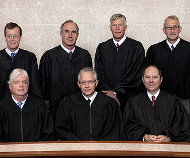Article from: www.thenewspaper.com/news/52/5247.asp
7/6/2017
Iowa Supreme Court Rejects Roadside Search Warrants
A divided Iowa Supreme Court refuses to require police to obtain a search warrant electronically before searching vehicles during a traffic stop.
 Roadside search warrants are not ready for prime time, a divided Iowa Supreme Court ruled last Friday. The high court concluded that advances in modern communications technology did not render obsolete the "automobile exception" that denies motorists the full Fourth Amendment protection against warrantless seizures.
Roadside search warrants are not ready for prime time, a divided Iowa Supreme Court ruled last Friday. The high court concluded that advances in modern communications technology did not render obsolete the "automobile exception" that denies motorists the full Fourth Amendment protection against warrantless seizures.
The decision was made in the context of the April 19, 2015 traffic stop in which Christopher George Storm was placed under arrest. Dallas County Sheriff's Deputy Clay Leonard had seen Storm driving his Chevy pickup truck on 141 without wearing his seatbelt.
So the deputy ordered Storm to pull over and during the traffic stop, the smell of marijuana was noticeable. Over Storm's objection, the deputy decided to search the truck. He found 47 grams of marijuana and a bottle with amphetamine pills. At trial, Storm's attorney argued that the world had changed considerably since the courts invented the automobile exception in 1925. Back then, police had to appear in person before a magistrate to obtain a warrant. Because cars are mobile, there is a chance the vehicle would be gone by the time the officer returned to the scene with a warrant. Today, the information can be submitted to a judge electronically from the roadside, while keeping an eye on the vehicle. The sheriff's department said it was not that easy.
"There's a misconception that these in-car computers are, you know you're going to sit there and you're going to write all your reports on this in-car computer," Sheriff's Lieutenant Adam Infante testified. "We're not typing an affidavit on our in-car computer. We're going back to the office where we can sit down, face a computer, do it correctly... The in-car computer is not what people think it is."
The defense expert witness, a former police officer, testified that it could be done within 30 minutes on the roadside. In New Jersey, telephonic warrants took an average of an hour to complete, but the Iowa court majority saw no need to change the warrant standard.
"At this point, forcing an officer to draft a search warrant application while multitasking on the side of the road may jeopardize the accuracy of the warrant application and would require motorists to be detained for much longer periods," Justice Thomas D. Waterman wrote for the majority. "On the civil liberties side of the ledger, we perceive no meaningful net benefit to motorists being subjected to longer seizures. Our court has indeed expressed a preference for warrants. But the purposes for requiring warrants are not furthered here."
The majority reasoned that the exclusionary rule protects from unreasonable searches by suppressing evidence when police do not have a valid reason to conduct a search. Justices Daryl L. Hecht, Brent R. Appel, David S. Wiggins disagreed, arguing that it was time to require police to use roadside electronic warrants as long as Internet connectivity is available.
A copy of the ruling is available in a 300k PDF file at the source link below.
Source: Iowa v. Storm (Iowa Supreme Court, 6/30/2017)
Permanent Link for this item
Return to Front Page
 Roadside search warrants are not ready for prime time, a divided Iowa Supreme Court ruled last Friday. The high court concluded that advances in modern communications technology did not render obsolete the "automobile exception" that denies motorists the full Fourth Amendment protection against warrantless seizures.
Roadside search warrants are not ready for prime time, a divided Iowa Supreme Court ruled last Friday. The high court concluded that advances in modern communications technology did not render obsolete the "automobile exception" that denies motorists the full Fourth Amendment protection against warrantless seizures.